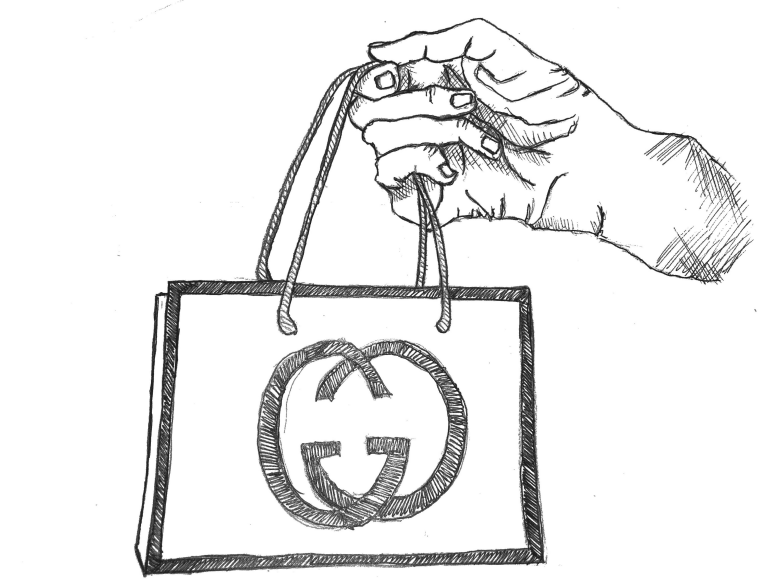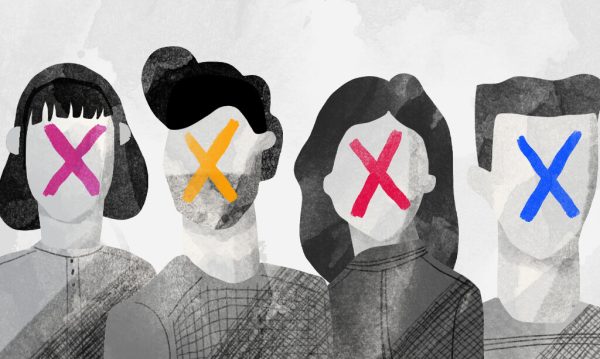Teens Should Not be Affected by Flashy Product Labels
After taking a walk through the hallways, one is almost guaranteed to see a Champion sweatshirt, Lululemon leggings or a pair of Adidas sneakers. Teenagers have become so focused on wearing clothes for the brand name alone that they too often abandon clothing that correlates with their own personal style because they do not want to be seen as different. But if these logos were removed from the shirt, would teenagers still sport them? The pressure to live up to status is not just present in the fashion industry: in other aspects of life, teenagers have become more materialistic, valuing wealth and fame increasingly more. Teenagers should worry less about status and focus more on what actually appeals to them, for they are too worried about judgment from their peers that they suppress genuine interests in attempts to be accepted.
In celebrity style, luxury brands such as Gucci, Louis Vuitton, Supreme and Fendi have become more prominent than ever, and the clothing is supported in such a blatant way that a celebrity’s whole outfit depends on the brand name alone. Emma Chamberlain sports her overpriced Balenciaga sneakers, Jeffree Star wear Gucci jumpsuits and Kylie Jenner’s daughter wears a mini Louis Vuitton bag. These brands’ monograms have transformed from being a small label in the corner to dominating the whole article of clothing.
Aside from more luxury brands, many teenagers wear brands that are trending at the moment simply to follow the fad. A brand’s popularity comes and goes, yet many teenagers are influenced by seeing their peers wear the trending brands or seeing people online wearing them, so they opt to because of the fear of their style being unfashionable or uncool. Many teenagers go even so far as to all buy the exact same piece of clothing simply because everyone else seemingly has it. Some recent examples include Adidas Superstar sneakers, Nike Air Force 1s or Gucci belts. All of these articles of clothing cost a decent amount of money, yet teenagers are willing to spend it because they perceive it as a means of fitting in with popular brands.
With the rise of social media and social media influencers, celebrities have endorsed high end or trendy brands to get across more easily to a younger audience. Celebrity advertising and brand deals, including Sugar Bear Hair and Sephora Collection, have also influenced consumer culture, for a teenage consumer may only buy items from a particular brand because his or her favorite celebrity endorsed it. A brand or label has defined what is considered of status, but teenagers should avoid falling into the habit of focusing on brands simply because of a label and buy what truly fits their style. A pair of Lululemon leggings does not always have to beat out a $10 pair from a cheaper store. Additionally, many teenagers keep up with wealthy celebrities to vicariously experience their luxurious lives, lives many cannot remotely relate to, although they may wish they could.
The pressure of living up to status alone is so prominent in teenagers’ lives where they are constantly being judged for practically anything they do. Valuing labels and brands does not just exist in the clothing industry; many people in all aspects of life feel pressured to conform to what is considered of better status. For instance, in the college process, society has conditioned the youth to value institutions more for the name alone. Going to a “good” college has surpassed going to a school that fits with individuals’ personalities and interests; additionally, immense debts often result from these brand name schools. Similarly, society’s views on job status function in similar ways, where only the highest paying jobs receive the most praise, and teenagers choose majors and jobs that will guarantee high incomes after college, even if that is not what they are interested in. Being an artist is not necessarily the most sought after job because of the low pay that comes along with it. Subsequently, teenagers sacrifice their individuality to conform to societal standards.
Nonetheless, money and status should not be the primary factors in determining happiness. Teenagers, however, focus too much on these components as a means to be accepted. Instead, teens should be both more accepting of others who cannot live up to society’s expectations of wealth and status, and they should also embrace their individuality and personal style rather than simply following whatever is considered trendy at the time.

Molly O'Connell, class of 2019, is an Editor-in-Chief for The Rebellion. In school, she is a part of National Honor Society, Latin Club, and Student Council....











